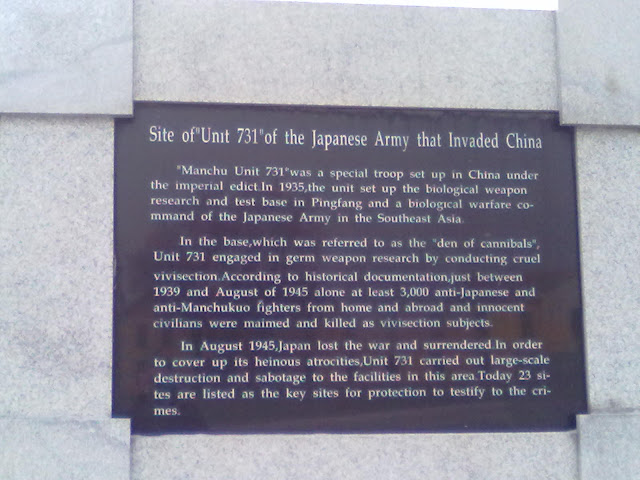Harbin: "Rooms to rent for fifty cents"
 I went to Harbin the week prior to my departure for Spring Festival.
I went to Harbin the week prior to my departure for Spring Festival.Luckily, Shannon and I, who would be joined by our friend from Heilongjiang Province the next day, found seats on the green train. Our twenty yuan tickets for the two-and-a-half hour ride were for standing room only, but an elderly man pushed me into his seat violently (with a smile), insisting that he was a smoker and therefore standing in the aisle would work well for him. Shannon perched on the edge of a seat filled with students from Ji Da (Jilin University). I sniffled and learned to play the "landlord game" with a deck of cards and three middle-aged men, who viewed me with both admiration and derision.
I called the sinohotel.com people twice to make sure that we could arrive late, as the train from Changchun did not arrive until around midnight. We got there easily enough, but I was beginning to really suffer from a head cold that was part of the aforementioned flu. We popped into a cab and headed away from the station. It was not long before it became clear that the cabbie did not know where to take us. We gave him a small fortune and he disappeared into the night, leaving us at the doorstep of a hotel that had "no room in the inn." We hailed a second cab that knew where our reservation was, but we found the attendant sleeping behind the check-in counter. Groggily, she reported to us that the room had been given away. We walked out into the frigid night, discovering a hostel and several more hotels that had been battened down for the night. Around 1:30AM we found ourselves in a warm, well-lit Kentucky Fried Chicken. While I went to the bathroom, Shannon tried her Mandarin out on the only two patrons--a pair of students studying for a test. They knew a place where we could stay for forty yuan a night. We walked about forty-five minutes and found it. I might have had a breakdown had we not.
The next morning, I slept till about 10AM. Lu came up from Changchun in the morning, as we should have done, and met us at the hotel. We went to the drugstore and then lunch, before taking a bus to the Harbin International Ice and Snow Sculpture Festival. This was, in addition to being five degrees colder than the rest of the city, one of the most amazing feats of human ingenuity, creativity, and engineering that I have ever witnessed. I don't have pictures, though, as we decided to do a tubing ride down the hillside and my camera bounced out of my pocket. Apparently, it landed in the bowels of the tube where a subsequent rider found it, but said person failed to turn it in. After the festival, we had a nice dinner and went to bed.

We also visited the famous Russian Orthodox Church, St. Sofia's, which was a gallery of early photographs of Harbin and a concert hall for a decent performance of choral music that had commenced already when we entered. Strange to pay admission to gain entry to a house of worship, but this is officially atheist China.
 |
| The sign at the entrance to the haunting premise of Unit 731. |
There was a diorama of Chinese citizens crucified in a circle and Japanese persecutors watching through binoculars and in gas-masks as a plane with a chemical bomb swooped in to drop its poison. There were meat hooks for human viscera and pictures of the frostbite experiments. There were empty mustard gas bombs that still turn-up unexploded and sicken people. It gave me a better understanding of the deep-seated hatred of the Chinese for the Japanese. That no official acknowledgement of this has come from the Japanese is certainly a tragedy.
Flight Home
I left Changchun on schedule to come home to America for a visit. I flew to Shanghai and then left Shanghai on time, as well. We got to Narita (the Tokyo Airport) twenty minutes late. Air Nippon representatives flagged down the seven people connecting to Newark, NJ, at the end of the ramp as we exited the plane, explaining that we would not be able to make our connection. The Spaniard was rude. The Chinese-American with the New York baseball cap was profane. Three students and I agreed to the detainment for a while, then mutinied, rushed up the stairs, cut the line, and plummeted down the elevator to the gate. The plane was still there, but the door was shut and we watched as it pulled away, as we pleaded for the Continental/United staff to let us on.
As it turned out, Narita was wonderful. The airline put us in a hotel with tiny, very highly-equipped rooms and there was a spa. We all slept in after a great, authentic Japanese dinner.
 |
| Pagoda in Narita-san. Learn more. |
It was pure magic to watch as the restaurant workers sat at a long table, plucking writhing eels from a bucket, pinning their heads to the table, and then chopping them up while they were still alive. They de-boned them and, like Gaul, divided them in three parts before piercing them with skewers and handing them off to the cooks, who would grill them before throwing the finished, delectable product into bento boxes of rice. We hurried back to the hotel and got to our plane in plenty of time, learning that ANA or Air Nippon had failed to re-book us for the next day after Continental (United) denied us the ability to board our original flight.




